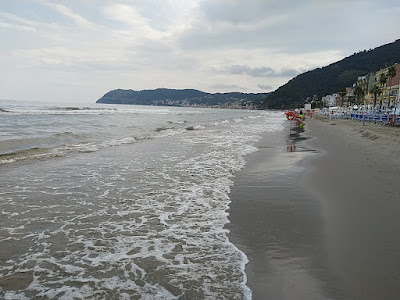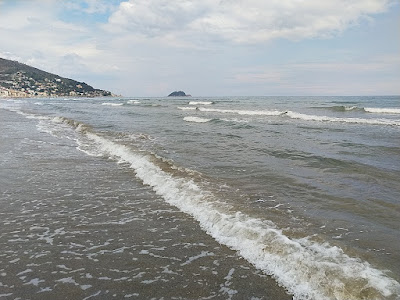 |
| The sandy beach in Alassio |
Alassio is a small town of 10,000 on the Italian Riviera, in the region of Liguria, and is known for its shallow, endless beaches. And here,the beach is composed of fine sand, so much nicer to walk on than the pebbly beaches of the Cote d'Azur. After two hectic weeks in Nice - wonderful but tiring - I've come to Alassio to relax, enjoy the sea, and write.
 |
| The bagni are ready for the summer crowds. |
In July and August, Alassio swells with untold numbers of vacationers eager for the beach experience, but the day I arrived in early June, the beach was nearly empty. The local beach concessions, known as stabilmenti balneari or bagni, are up and ready for customers, offering two lounging beds (lettini) and a large umbrella for 20-50 euros per day. A bit exorbitant for my budget, so I sought out the free beach (spiaggia libera). It took a while, but I eventually spied a small, empty space sandwiched between two bagni. That will be my go-to spot for the next week.
 |
| La spiaggia libera. |
An Italian friend informed me that free beaches must be provided in each town, by Italian law. In addition, the first ten meters of the shoreline (bagnasciuga) must be left open for public use, so that people can walk along the beach. Looking deeper into the beach rules in Italy, I discovered that many changes are in store, and some have already been implemented. In Sorrento and Rapallo, for instance, swimwear is not allowed on city streets, and large fines are given to those walking around only in swimsuits. In Le Cinque Terre, flip-flops are not allowed on the hiking trails.
 |
| A view to the east of town. |
A major change is in store for the 30,000 concessions (the previously mentioned bagni) that cover 98% of the beaches in Italy. To comply with EU regulations , a new law going into effect next year means that instead of families automatically renewing their licenses to run the concessions, as they have done for generations, they will have to compete with interested parties from across the EU, which could introduce big businesses. The law was to take effect in December 2023, but Meloni's government has provided n extension for one year. It has become an understandably volatile controversy. Italians have been complaining for years about the high cost of going to the beach while the concession owners fear the loss of their livelihoods. How things will play out in the next several years is anyone's guess.
My plan is to hit the beach by 9 a.m. each day and enjoy a few hours of beach life while people are few in number and before it gets hot. But I also enjoy watching children at play in the sand, witnessing other activities of beach life as they unfold, and being part of that life, so unlike my landlocked home in the States. It would be a shame to see this kind of beach experience altered or constrained by too many rules.
While in Italy, I also went to Genova, Boccadasse, Camogli, Rapallo, Santa Margherita Ligure, Portofino, and Zoagli along the Italian Riviera, and will post about those adventures at some point. But Alassio was the highlight of my time in Italy this year.
No comments:
Post a Comment